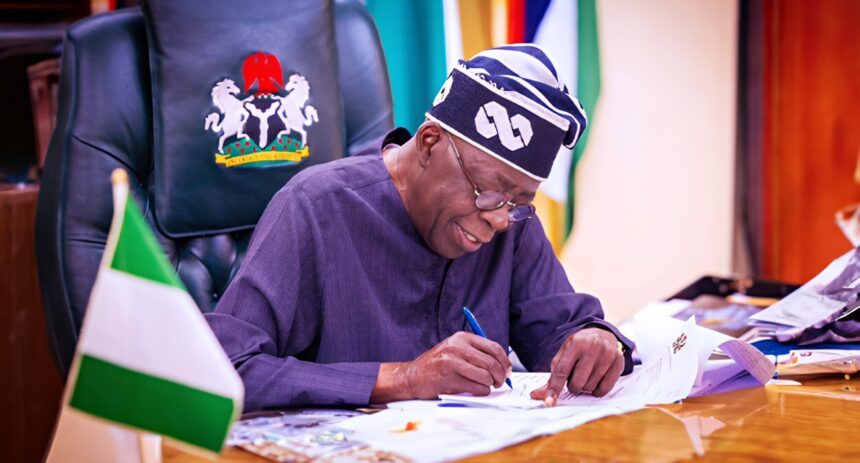Following intense public scrutiny and national debate, President Bola Ahmed Tinubu, has signed the updated presidential clemency list.
Pan-Atlantic Kompass reports that Tinubu, in the new presidential clemency list removed the names of some individuals who were earlier convicted for various offences.
The Special Adviser on Information and Strategy, Bayo Onanuga, made this known in a press statement issued on Wednesday.
Onanuga, in the statement said Tinubu updated the presidential clemency list following consultations with the Council of State and public opinion on the matter.
The statement also disclosed that following the review, certain persons convicted of serious crimes such as kidnapping, drug-related offences, human trafficking, fraud, unlawful possession of firearms/arms dealing, etc, were “deleted from the list”.
The statement reads in part: “This action became necessary in view of the seriousness and security implications of some of the offences, the need to be sensitive to the feelings of the victims of the crimes and society in general, the need to boost the morale of law enforcement agencies, and adherence to bilateral obligations.
“The concept of justice as a three-way traffic for the Accused, the Victim, and the State/Society also guided the review.”
Onanuga, in the statement further stated that the approved list of eligible beneficiaries had been transmitted to the Nigerian Correctional Service for implementation in line with the duly signed instruments of release.
He also added that Tinubu has directed the immediate relocation of the secretariat of the Presidential Advisory Committee on Prerogative of Mercy from the Federal Ministry of Special Duties to the Federal Ministry of Justice.
This, he said, is to ensure that future exercises meet public expectations and best practices.
“President Tinubu also directed the Attorney-General of the Federation to issue appropriate Guidelines for the Exercise of the Power of Prerogative of Mercy, which includes compulsory consultation with relevant prosecuting agencies.
“This will ensure that only persons who fully meet the stipulated legal and procedural requirements will henceforth benefit from the issuance of instruments of release.
“The President appreciated the constructive feedback and engagement from stakeholders and the general public on this matter. President Tinubu also reaffirmed his administration’s broader commitment to judicial reforms and improving the administration of justice in Nigeria,” the statement added.
Pan-Atlantic Kompass reports that Maryam Sanda, one of the beneficiary of Tinubu’s initial presidential clemency list saw her bame crossed out.
Instead, Tinubu reversed the sentence of Sanda, who was sentenced to death in 2020 for the killing of her husband, Bilyaminu Bello, to 12 years.
According to the statement, Sanda, who had already spent six years and eight months at the Suleja Medium Security Custodial Centre, will now spend approximately six additional years in jail after getting an approved term on compassionate grounds.
It read, “Maryam Sanda, whose offence was culpable homicide, sentenced on 27/01/2020 with death by hanging, has served six years and eight months at the Medium Security Custodial Centre (MSCC), Suleja will now serve 12 years based on compassionate grounds, in the best interest of the children and good conduct, embraced a new lifestyle, model prisoner and remorsefulness.”
Pan-Atlantic Kompass reports that the development came following public uproar on the presidential clemency list initially released by Tinubu.
The list published on the official website of the state house included convicted drug lords, murderers, and other serious offenders among its 175 beneficiaries.
The presidential clemency list generated public uproar with some critics decrying it as a dangerous erosion of justice and supporters hailing it as a compassionate step toward rehabilitation and historical reconciliation.
Tinubu’s Presidential Pardons by Crime Category
• Drug-related offences: 70 individuals (40%)
• Illegal mining offences: 60 individuals (34%)
• Financial/white-collar crimes: 30 individuals (17%)
• Violent/capital offences: 25 individuals (14%)
• Property hijacking/maritime: 10 individuals (6%)
• Arms-related offences: 6 individuals (3%)
• Human trafficking/exploitation: 4 individuals (2%)
• Other: 3 individuals (2%)
Below are some Names of the convicted individuals granted clemency initially;
Maryam Sanda
Maryam Sanda, the woman sentenced to death in 2020 for killing her husband, Bilyaminu Bello, son of former PDP National Chairman, Haliru Bello, in 2017, is among those recently pardoned by President Bola Ahmed Tinubu.
Her case was one of Nigeria’s most talked-about domestic violence cases.
Sanda, aged 37, was sentenced to death by hanging after the court found her guilty of culpable homicide for stabbing her husband during a domestic dispute in their Abuja home in November 2017.
Kelvin Ibruvwe Oniarah
Also included in Tinubu’s presidential pardon list is a notorious kidnap kingpin Kelvin Oniarah, also known as Kelvin Ibruvwe or Kelvin Oniarah Ezigbe.
Oniarah is the man responsible for the 2013 kidnapping of constitutional lawyer Mike Ozekhome (SAN) and the murder of Chude Nwike, former Deputy Governor of Anambra State.
Records show that Oniarah was sentenced in October 2023 to 20 years imprisonment for kidnapping, to take effect from 2013 — when he was first arrested.
His sentence was later reduced to 13 years for showing “remorsefulness” and participating in rehabilitation programmes, including studies at the National Open University of Nigeria (NOUN).
Kelvin, once one of Nigeria’s most feared kidnappers, led a brutal gang that terrorised parts of Delta and Anambra States during the height of Nigeria’s kidnapping epidemic.
His arrest in 2013 had been celebrated as a major victory for security forces — making his sudden release under Tinubu’s government even more alarming to many Nigerians.
Major Suleiman Alabi Akubo
In 2008, a military court found Major Suleiman Alabi Akubo guilty of betraying the Nigerian military. He was convicted of stealing over 7,000 weapons from the Nigerian Army, weapons meant for the nation’s defense, and selling them to militants who turned them on his own comrades. Soldiers died.
Farouk Lawan
A former Nigerian lawmaker, Farouk Lawan was convicted in 2021 for corrupt practices. He had served his sentence and was among those pardoned by President Tinubu as part of the 175 convicts granted mercy.
Professor Magaji Garba
Convicted in recent years for obtaining money under false pretences, Professor Magaji Garba had already served part of his sentence.
He is among the living convicts whose sentence was initially commuted or forgiven under the prerogative of mercy.





